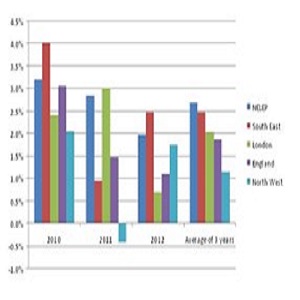Achievements and areas earmarked for action will come under the spotlight at the North East Local Enterprise Partnership’s (LEP) first Annual General Meeting this week (Wednesday, 13 November).
Thousands of jobs and hundreds of millions of pounds of investment have been brought to the North East LEP area through its success in attracting funding and national initiatives to underpin sustainable regional economic growth.
Paul Woolston, chair of the North East LEP, said:
“The highlights of our first two years include the commissioning and production of the North East Independent Economic Review, led by Lord Adonis, which creates a blueprint for regional growth up to 2020.
“We have set ambitious targets and brought major funds to the region, including European Structural Funding 2014-2020, Regional Growth Funds and Growing Places Funding, the latter two of which allowed us to create the £55m North East Investment Fund.
“More and better jobs for the North East is our priority and it is heartening to see that we have already created or safeguarded thousands of jobs through the North East Enterprise Zones, support for major developments and improved access to finance for SMEs.”
The North East LEP’s first review, covering 2011-13, shows that the region’s economy is growing. Based on GVA (gross value added), the North East economy is performing better than anywhere else in England outside of London and the South East. However, the low regional employment rate means the North East LEP area is below average on GVA per head, partly due to the higher rate of public sector employment, which provides a lower GVA per head than private sector jobs.
Informed by the Adonis Review, the North East LEP’s review focuses on six key themes to fuel regional growth – making, trading, innovating, connectivity, skills and community.
Making, which includes investment funds, has seen more than £38m approved for schemes such as Newcastle’s Stephenson Quarter, via the North East Investment Fund. The fund has drawn in around £142m of additional direct economic activity and created 1,486 direct jobs. More than 400 jobs have been safeguarded and more than 2,500 indirect jobs are set to be created.
Future projects being considered include further investment in the growth of the sub-sea industry for new and renewable energy projects and the development of new trading links. Plus, the £7.5m extension of the JEREMIE fund for start-up and knowledge-based firms, agreed in June, is forecast to create 700 jobs and safeguard 400.
The North East Enterprise Zone, classified under the trading remit, has attracted £56m of private and £59.3m of public investment, created 451 jobs and led to the development of almost 16 hectares of land. The Enterprise Zone covers 10 sites on land next to the A19 and Nissan at Sunderland, the North Bank of the River Tyne and at the Port of Tyne, and land next to the Port of Blyth.
Prof Roy Sandbach was appointed to head the LEP’s innovation growth this year. The former Procter & Gamble innovation leader is developing a strategy to be published in 2014. Collaboration with the region’s universities is high on the agenda and the first innovation conference, focusing on the automotive sector, was held last month.
The North East LEP is one of three in the UK which is piloting a local skills system, designed to provide key skills that regional employers need.
The four-year Youth Contract programme running in Newcastle, Gateshead, North Tyneside, Northumberland and County Durham has won £5m of public money and £4.6m from the private sector to train around 13,000 young people and create thousands of jobs.
Connectivity is focusing on reducing transport congestion and improving internet use to boost business competitiveness. The North East LEP is also working with universities and stakeholders to develop the region as a centre for low carbon vehicles.
The community remit brings together all sections of the community to improve urban and rural job opportunities. The £3.2m Rural Growth Network is one of five in England aiming to support rural firms and create jobs. The pilot project aims to create 40 new businesses, create or safeguard 300 jobs, and provide help for 200 businesses.
Urban projects are being supported via the Public Works Loan Board, which is able to borrow up to £60m at reduced rates.
North East LEP director Edward Twiddy said:
“In its first two years, the North East LEP has made some major strides forward in its work to boost the region’s economy. We started work during the recession, and now the economy appears to be gaining sustained momentum, we are looking forward to seeing our strategies bear fruit.
“There is much still to be done, but I believe we have established a firm foundation for regional growth, based on the private and public sector working together with support from the region’s world class universities and all sectors across the North East.”
The LEP AGM is on Wednesday 13 November 9.30am-12 noon at Durham County Cricket Club.
The programme for the North East LEP’s AGM is:
9.30 Registration (refreshments will be served)
10.00 Welcome- Paul Woolston, North East LEP, Chairman
10.15 State of the North East Economy- Edward Twiddy, Director, North East LEP
10.30 Skills in North East England- Anne Isherwood, North East LEP Board Member
10.50 Update on North East Investment Fund- Jeremy Middleton, North East LEP Board Member
11.10 Panel Questions & Answers- Chair: Paul Woolston
[Panel: Cllr Simon Henig, Andrew Hodgson, Edward Twiddy]
11.50 Next Steps and Way Forward- Paul Woolston
12.00 Meeting Close & Lunch
If you would like to attend the AGM or arrange an interview in advance please get in touch with Christine Holland. Tel: 01670 790246 or 07711 698246.








